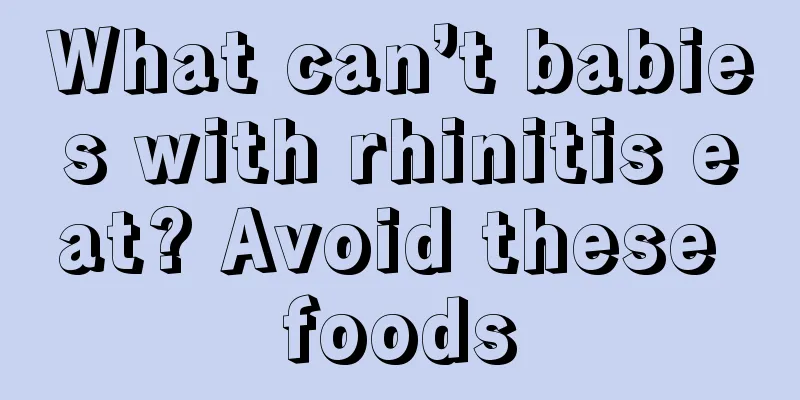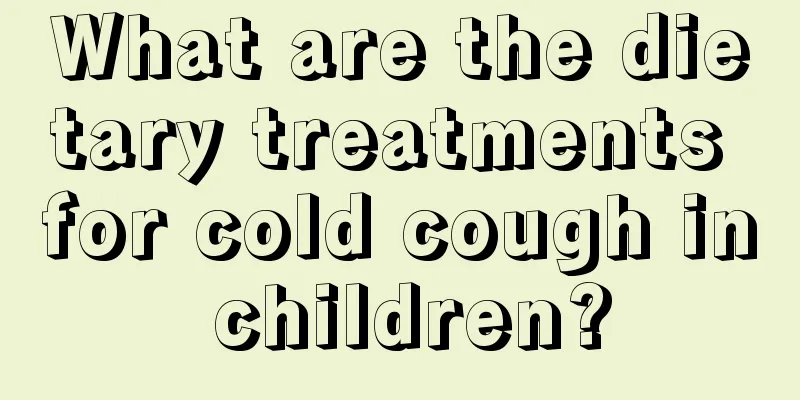What is the cause of diarrhea in a one-year-old baby?

|
Babies are always prone to certain conditions due to their lack of resistance and other reasons. Many parents don’t understand these conditions very well because they have just had their babies. Therefore, dealing with this situation will make you feel overwhelmed and cause many problems to arise, which will bring more impact to the baby's body. So, what is the reason for a one-year-old baby to have diarrhea? Let me introduce it to you below, I hope you can understand it. Causes of diarrhea in babies There are many reasons for diarrhea, some are due to "stomach upset", some are contagious, and some are "physical" problems. Many different diseases can present with diarrhea as a symptom, so understanding why it occurs can help with treatment. Diarrhea can be divided into acute and chronic depending on how long the symptoms occur. Acute diarrhea usually lasts no longer than fourteen days. Acute diarrhea is often caused by infection, unclean food and drinking water. Increased frequency of bowel movements during diarrhea will lead to increased consumption of nutrients and water in the body. At the same time, decreased gastrointestinal digestive function and decreased appetite will cause a decrease in nutrient intake. So what are the dietary considerations when a baby has diarrhea? Therefore, the child's diet should be arranged reasonably. During illness, drink more water, such as boiled water, fresh fruit juice, etc. Feed breastfed children more breast milk; choose light foods that are easy to digest and absorb, such as milk, egg custard, lotus root powder, rice porridge, etc.; use small amounts and multiple feedings. During the recovery period of the disease, gradually increase the types of food and transition from semi-liquid food to soft food and then to daily diet. Within half a month after recovery from illness, add one meal a day to make up for the loss during the illness. The amount of the extra meal should be equivalent to the main meal, and there should be a 3-hour interval between it and the main meal. If you add too much food, it will increase the burden on the gastrointestinal tract and affect recovery from the disease. (1)Diet. The baby is too young, his digestive function is not yet perfect, and his own digestive enzyme secretion is very small. Do not let the baby eat too much, eat food that is difficult to digest, or change the baby's food frequently, as this will cause diarrhea in the baby. In addition, eating unclean food can also cause diarrhea in babies. (2) Infection. Because babies have poor gastrointestinal immunity and are more susceptible to viral infections, rotavirus infection is a common cause of diarrhea in winter. In addition, if the cups and complementary foods used to consume milk powder are not thoroughly disinfected, there is also the possibility of infection. Once the baby eats it, it will cause diarrhea. (3) Improper care. In the cold winter, if the mother does not take proper care of the baby, the baby's abdomen will easily catch cold, intestinal motility will increase, and diarrhea will be induced. (4)Being sick. If babies are infected with colds, pneumonia and other diseases, they may also suffer from diarrhea. 1. If the diarrhea is mild, just dilute the milk and reduce the lactose concentration. The diarrhea will improve. Wait until the diarrhea is cured and then adjust the concentration back to the original concentration. 2. If you have bowel movements frequently every day, you must replenish water and electrolytes in time. Oral electrolyte water is generally sold in hospitals, and parents should give their children more light salt water to drink. 3. The diet should be light as much as possible. You can feed rice soup, porridge, bread and other foods. The above article introduced why a one-year-old baby has diarrhea, and everyone knows that it may be caused by diarrhea. Many times, it may be because of the parents' carelessness that the baby gets sick. Therefore, parents must be careful and meticulous in taking care of the baby, so as to ensure the baby's health and happiness. |
<<: What to do if your baby coughs and has a lot of eye mucus
>>: What should I do if my two-month-old baby has diarrhea?
Recommend
Child's wrist fracture
We all know that children's bones are particu...
How to supplement iron deficiency in babies
If parents find that their babies are often cryin...
What should I do if my one-year-old baby has a fever and the fever doesn’t go away?
Families with children are most afraid of their b...
Introduction to baby food for four months
The American Academy of Pediatrics recommends tha...
Whose blood type does the baby inherit?
Everyone has a blood type, which is mainly determ...
What are the dietary treatments for infant diarrhea? What should babies eat if they have diarrhea?
Diarrhea is a very common symptom among infants. ...
What is the reason why children always fall asleep in class?
Sufficient sleep is very important for children. ...
How to deal with children's colds in summer
Children are a group that is more prone to illnes...
What should I do if my child has chills and fever?
Children are the ones who need the most care in t...
The dangers of newborns falling asleep while feeding
The two most important things in life are getting...
Why does a five-year-old child speak unclearly?
Generally speaking, children can basically speak ...
How to cook eggplant for babies
As we all know, eggplant is actually a very nutri...
Spring calcium supplement recipes for children
Parents, please note that you must remember to su...
Why don’t children sleep at night? 8 reasons why your baby won't sleep
If a child does not sleep at night, it will affec...
Symptoms of viral cold and fever in children
Children have a viral cold, which is a particular...









